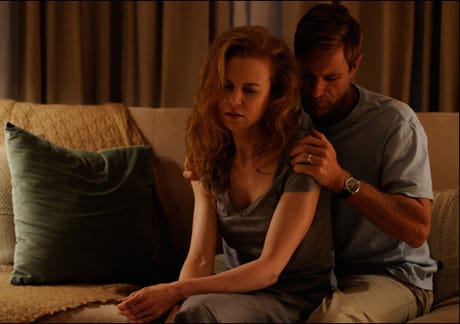It should be noted that while this adaptation of David Lindsay-Abaire's Pulitzer Prize-winning play of the same name does broach the tired topic of parents mourning the loss of their child, it never falls into the trap of mawkish histrionics or medicinal simplicity.
Rabbit Hole marks an interesting stylistic and thematic turn for indie director John Cameron Mitchell (Hedwig and the Angry Inch, Shortbus), examining complex, fully realized characters with restraint, simplicity and an oddly comedic sensibility, while giving Nicole Kidman the opportunity to show the world that her superlative performances in Margot at the Wedding and Dogville weren't just flukes.
Here, she plays Becca, a woman coping with the loss of her son through compartmentalization and the steely performance of normalcy. Husband Howie (Aaron Eckhart) embraces the grieving process differently, dwelling on home videos and running off to organized grief counselling sessions where he and the similarly doting Gaby (Sandra Oh) strike up inappropriate flirtations.
While Howie looks for the comfort his wife can no longer offer, Becca reaches out to the boy that accidentally killed her son, when not insulting pious grievers or snapping at her mother, Nat (Dianne Wiest), for comparing the loss of her 30-year-old junkie son to the death of her four-year-old, killed chasing a dog into the street.
What's commendable is the construction of a perspicacious and dramatically compelling narrative about people too damaged to generate ire via natural trajectory. They occasionally lash out, revealing unflattering emotional turmoil, but more often lifelessly adhere to the arbitrary quotidian routine.
If Mitchell's direction doesn't know entirely how to find the emotional centre of a moment, and Arton Sanko's score is a little too pat and bland to bring anything new to the table, the sharp, observational writing and thoroughly riveting performances from Kidman and Wiest more than compensate. There is bravery in their portraying of victims as complex, deeply flawed human beings that isn't often conveyed so shrewdly in film. But they capture it with truth, as does the entire supporting cast of this quietly impressive actors' piece.
Moreover, the scene where Kidman responds to a couple's assertion that God took their child because he needed another angel by saying, "I mean, he's God, couldn't he just make another angel?" is easily one of the most uncomfortably hilarious moments I've seen on film.
(Maple)Rabbit Hole marks an interesting stylistic and thematic turn for indie director John Cameron Mitchell (Hedwig and the Angry Inch, Shortbus), examining complex, fully realized characters with restraint, simplicity and an oddly comedic sensibility, while giving Nicole Kidman the opportunity to show the world that her superlative performances in Margot at the Wedding and Dogville weren't just flukes.
Here, she plays Becca, a woman coping with the loss of her son through compartmentalization and the steely performance of normalcy. Husband Howie (Aaron Eckhart) embraces the grieving process differently, dwelling on home videos and running off to organized grief counselling sessions where he and the similarly doting Gaby (Sandra Oh) strike up inappropriate flirtations.
While Howie looks for the comfort his wife can no longer offer, Becca reaches out to the boy that accidentally killed her son, when not insulting pious grievers or snapping at her mother, Nat (Dianne Wiest), for comparing the loss of her 30-year-old junkie son to the death of her four-year-old, killed chasing a dog into the street.
What's commendable is the construction of a perspicacious and dramatically compelling narrative about people too damaged to generate ire via natural trajectory. They occasionally lash out, revealing unflattering emotional turmoil, but more often lifelessly adhere to the arbitrary quotidian routine.
If Mitchell's direction doesn't know entirely how to find the emotional centre of a moment, and Arton Sanko's score is a little too pat and bland to bring anything new to the table, the sharp, observational writing and thoroughly riveting performances from Kidman and Wiest more than compensate. There is bravery in their portraying of victims as complex, deeply flawed human beings that isn't often conveyed so shrewdly in film. But they capture it with truth, as does the entire supporting cast of this quietly impressive actors' piece.
Moreover, the scene where Kidman responds to a couple's assertion that God took their child because he needed another angel by saying, "I mean, he's God, couldn't he just make another angel?" is easily one of the most uncomfortably hilarious moments I've seen on film.




